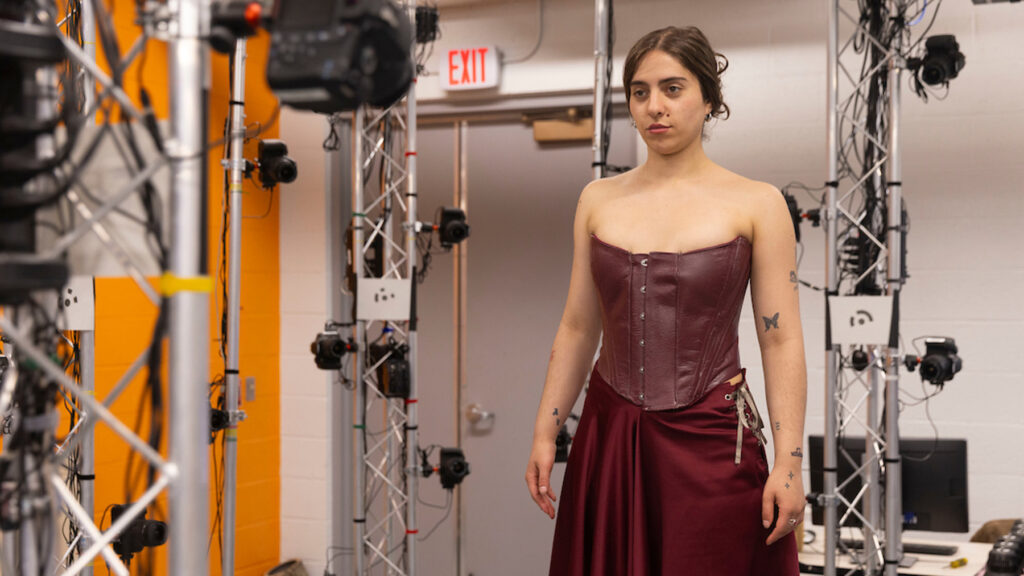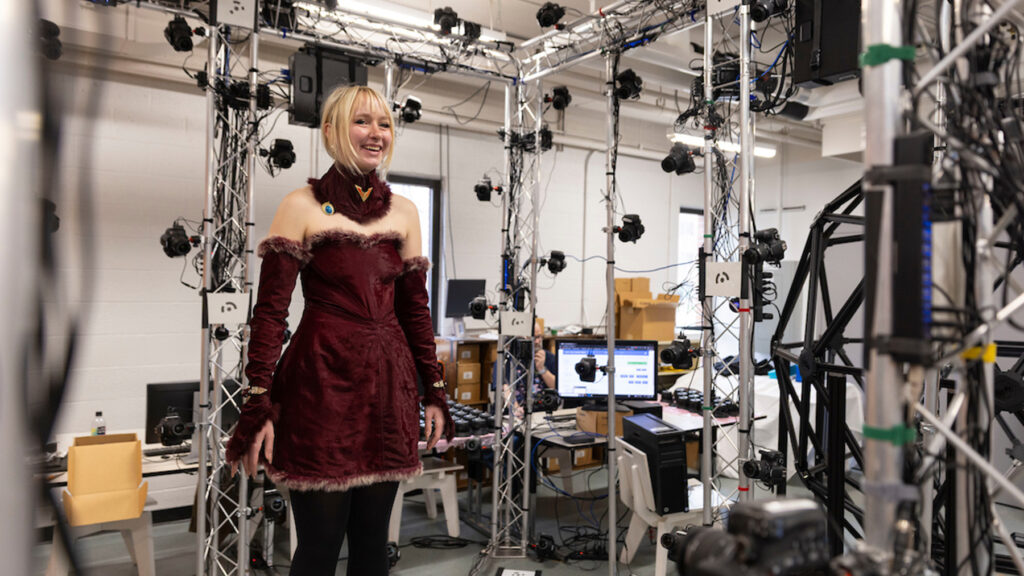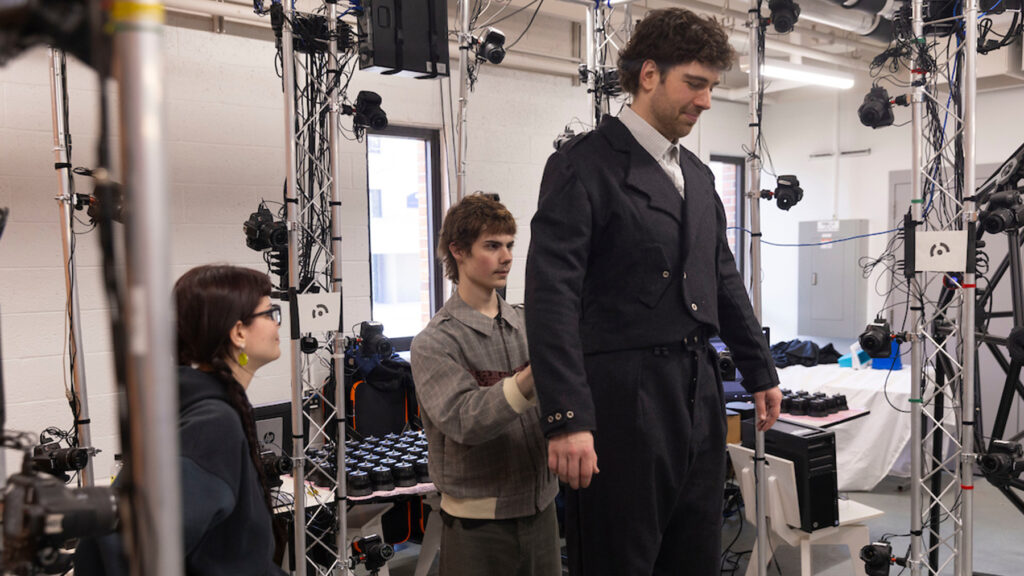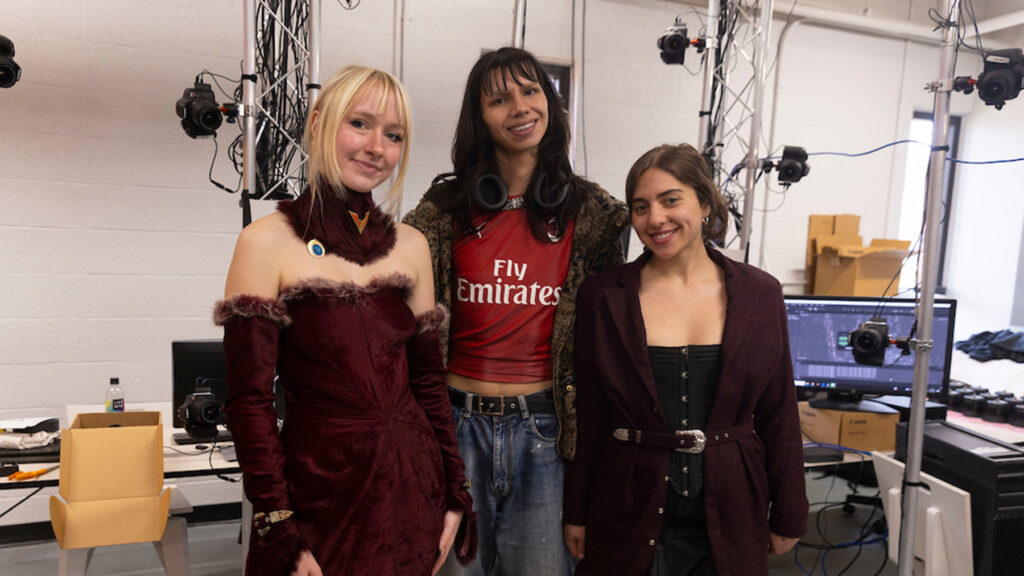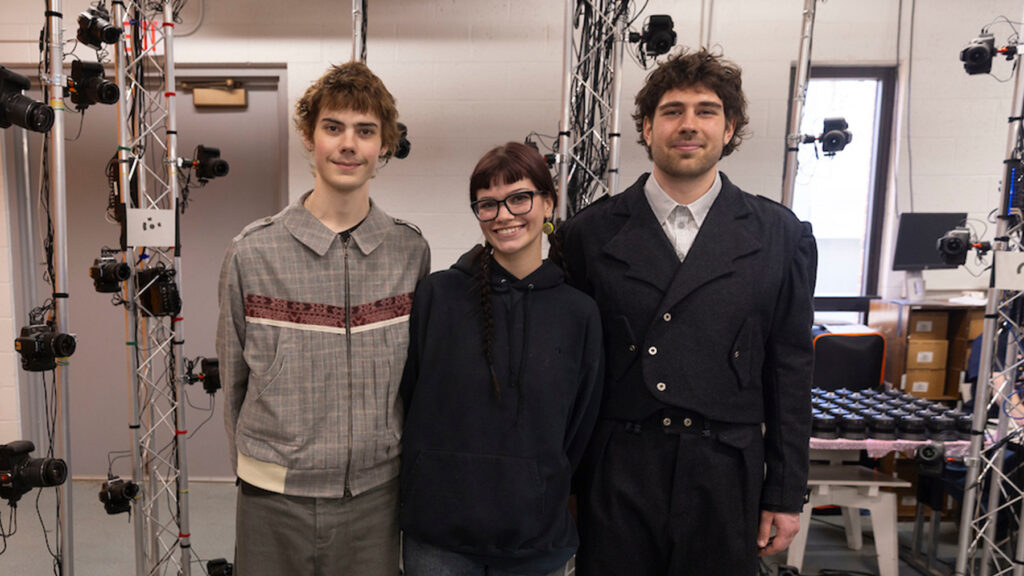Student’s apparel collections will premiere at WEAR Fashion Show, May 3
Menomonie, Wis. – Before stepping onto the runway at University of Wisconsin-Stout’s annual WEAR Fashion Show on Saturday, May 3, two fashion design and development students and their models joined Anna Mathsen, a professional and technical communication senior, for a photoshoot in the university’s PARSEC Lab.
This was no ordinary photoshoot, however. For her digital humanities capstone project, Mathsen is building a digital fashion portfolio of her friends’ apparel collections using the PARSEC Lab’s 3D- modeling photogrammetry software.
The collections, created by Mathsen’s boyfriend, Evan Tomczyk, and roommate, Lucas Moreno- Martinez III, will be premiered at WEAR, along with more than a dozen of their fashion design peers.
Moreno-Martinez’s collection “Vex” features four outfits inspired by Dracula’s brides and represents his different personalities. “The collection is versatile, with silhouettes that are both familiar and impractical, with dreamlike textures,” he said.
Tomczyk enjoys designing jackets. “Pants make an outfit, but jackets make it interesting,” he said. Two of his four jackets designed this semester will be modeled at WEAR.
WEAR will be held at 4 p.m. on Saturday, May 3, in the Memorial Student Center Great Hall. The vivid runway display showcases and celebrates fashion students’ innovative collections and illustrates their journey from hands-on, studio-based learning to wearable, industry-forward couture.
View the WEAR Fashion Show trailer and purchase tickets online.
UW-Stout fashion design graduates work in major design houses and apparel companies, including lululemon, Steve Madden, Ardisam Inc., Nike, Patagonia, and more, and have founded their own design houses, like the international boutique Mara Marie Bridal.
Fashion and photogrammetry
PARSEC – or Photogrammetry and Reflectivity for STEM Research and Education in the Chippewa Valley – is a photogrammetry space within UW-Stout’s Fab Lab.
It has 120 DSLR cameras mounted on a frame to capture 120 photos of an object or person simultaneously. The images, taken within milliseconds, are imported into software that stitches the images together into a detailed 3D model.
The technology is used to create assets in video games, architectural models, interactive digital artifacts for museums and more.
Mathsen, of Eden Prairie, had done a manual photogrammetry project in a previous digital humanities class, where she took dozens of photos asynchronously by hand and edited them herself to create a high-resolution scan.
“The PARSEC Lab is much more efficient. I was excited to use the equipment here. I hope more students use this space for their projects,” she said.
For her portfolio, Mathsen wanted to utilize what she’d learned and cater to her friends’ interests. “I admire fashion, and Evan and Lucas have a passion for design. I wanted to spotlight their work, their design process and completed looks,” she said.
Mathsen is using the Shorthand website creator to build the lookbook for the apparel collections. Student models were Marilena Grado, a fashion design student; Claire Jost, an industrial design student; and Isaac Tester, a game design and development senior.
Moreno-Martinez, a senior from Vesper, enjoys designing women’s wear and bringing his concepts to life.
“Vex” includes four outfits: one that shows the wearer is ready to go out for the night, one that is childlike, one that is masculine, and one that is wishful – a red bridal dress, reminiscent of “Beetlejuice.” His designs also remind him of his favorite song that his grandpa used to whistle.
“My grandpa got me to where I am today,” said Moreno-Martinez, who will graduate in December.
Tomczyk, a sophomore from Duluth, Minnesota, is inspired by older designers and tailoring styles and often finds styles by looking through his grandma’s catalogs from the 1930s. Modern international designers he admires are Martin Margiela and Junya Watanabe.
Among Tomczyk’s finely tailored suit jackets, he created an afterhood – a sweatshirt with a hood added to the garment after it is sewn – and a pair of cargo pants with patchwork to match the hoodie. Afterhoods were common in the 1930s and 1940s for winter sports.
Tomczyk will intern this summer as a tailor’s apprentice with Martin Patrick 3, in Minneapolis.
Hosted by the WEAR Fashion Association student organization, WEAR is part of UW-Stout’s Spring Showcase of student-centered events in April and May. Seniors also create their own design house, complete with brand names, marketing materials and business plans. Their collections will be on display at a trade show-style exhibit after the event in the MSC ballrooms, where attendees can meet the designers and see the garments up close.
Planning for this year’s event started late last summer. Faculty encouraged underclassmen to submit work, a process new to the event, which previously showcased senior capstone collections and select works by juniors. Among the capstone collections, WEAR will feature 10 suits by underclassmen, tied to an assignment directed by Program Director Sarah Eileen Smith.
“WEAR Fashion Show is a fantastic opportunity for students to showcase their work in a professional setting as they jumpstart their careers. It’s been inspiring to see new and seasoned students step up and take ownership of their creative growth this year,” said WEAR faculty adviser Bex Cermin.
“I’m especially impressed by the students who created complete two- to four-piece collections outside of any class project or assignment, just for this show. That kind of initiative and drive speaks volumes about the impact an upcoming, fashion-forward event can have on young artists and designers,” Cermin said.
Other UW-Stout fashion-focused events include Fashion Without Fabric. The sold-out show on April 12 featured 120 sculptured costume designs by 3D Design students, representing natural and man-made phenomena connected by this year’s theme, “Phenomonie!”
A student and community resource
Computer science Professor Seth Berrier built the software and complex camera system and manages the lab.
“We’ve had four student projects in the PARSEC Lab since it opened. Anna’s is the first communications/fashion design collaboration we’ve had,” he said.
Professional communications Professor Mitch Ogden, Mathsen’s capstone mentor, thinks, “Anna’s photogrammetry project is an inspiring example of Stout’s polytechnic model and is a convergence of degree disciplines. Where else do you get to see fashion and apparel design, computer science and technical communication come together? This is the cross-disciplinary magic of the digital humanities.
“Our program is pushing the envelope for what we think of as ‘content’ and how we imagine putting that content into the world. Photogrammetry is a powerful approach. Already, clothing retailers are exploring moves towards 3D modeling of clothes,” Ogden added. “As technologies evolve and our consumer habits with them, there will be continued innovation in this field. Anna’s project prepares her to be ready for those opportunities of the future.”
Berrier would like to make the lab portable to bring the cameras to clients and to various campus events, such as Fashion Without Fabric. He is also hoping the lab can be a part of the new Virtual Reality/Augmented Reality Space in development in the University Library.
The PARSEC Lab opened in 2022 and was made possible through a National Science Foundation grant. Internal and external partners have included the University Library Archives and the Dunn County Historical Society to capture artifacts using 3D imagery.
The Fab Lab is free to use for UW-Stout students. Training on laser cutters, 3D printers and leading- edge digital fabrication tools empowers students to design, prototype and build nearly anything they envision. Through memberships, it is available for community members to use after completion of the Introduction to Fab Lab Equipment training.
The fashion design and development program is part of the School of Art and Design, one of the largest public art schools in the Midwest. It also offers bachelor’s degrees in animation and digital media; game design and development-art; graphic design and interactive media; illustration; industrial and product design; interior design; studio art; arts administration and entrepreneurship; and video production, as well as an M.F.A. in design. UW-Stout also has a new program in game and media studies.
UW-Stout, a member of the Universities of Wisconsin, is Wisconsin’s Polytechnic University, with a focus on applied learning, collaboration with business and industry, and career outcomes. Learn more via the FOCUS2030 strategic plan.
